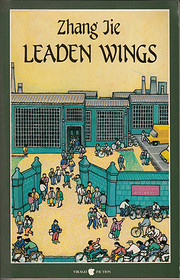

Pikkukuvaa napsauttamalla pääset Google Booksiin.
|
Ladataan... Raskaat siivet (1981)Tekijä: Jie Zhang
 Ei tämänhetkisiä Keskustelu-viestiketjuja tästä kirjasta.   ) )Many Characters and Few Descriptions Zhang Jie's "Leaden Wings" (sometimes translated as "Heavy Wings") is a difficult read because of the numerous characters and the lack of traditional narrative. It makes up for it by being the first novel I read that was written contemporaneously with the end of the Cultural Revolution. Virago's copy of the book, with a beautiful painting of a factory on the cover, includes a list of characters before the novel begins. This is a helpful resource, but sometimes I found myself looking up two or three characters on a page. Several names were similar and I became confused. The author or the translator also mixed given names with westernized translations of the names. I love Chinese literature and am accustomed to the names, but this was just a bit too much for me. There is no traditional western narrative with an exposition, climax, and resolution. Instead, each chapter looks at how different characters interact with each other. This threw me off because I expected to hear from characters introduced in earlier chapters, such as the orphaned young man who lived with a journalist, but they appeared only sparingly in later chapters. Instead of a typical plot structure, we have an ongoing conflict: reformers versus Maoists. Both groups are cliquish and disagreements flow from those groups. Tension is shown by one clique speaking to a members of the same clique, such as the young factory workers celebrating a bonus who reveal their thoughts to an older reformer who they don't know is actually a minister in charge of the factory. Zhang Jie's descriptions and personal thoughts about this are very transparent. There are several criticisms of the party structure in China, with non-party members being overlooked or scorned by party-members. There is no subtlety here. While that might make for poor literature, it was no doubt refreshing and insightful for many readers at the time. There are several positives to this book, however. It is one of only a handful of novels written in the late '70's and early '80's that have been translated. That alone makes the book truly valuable. In addition, the not-so-subtle jabs at the old-liners certainly were brave moves by Zhang Jie. The book also features prominent female characters, including a muckraking but quiet journalist, a poorly-treated widow, and a vacuous wife of an official. All of these characters deserve further treatment, however. Although I only give this book two stars on account of its' literary merits, I recognize that the book is very important. Students of Chinese reformist history and fans of Chinese literature will find that this book fills a very empty hole. I'm glad I've read this book. Theme-wise it is not an easy book, but it reads okay, if you're not paying any attention to the language that is a tid bit outdated. For me it was very much worth reading, because I'm interested in China and know a little about the country as well as about Eastern European countries. The things that Zhang Jie describes (bureaucracy, hard work, women at work successfully, not heard at home which causes trouble) are familiar. I knew it was the way things worked in Russia during the Soviet era, but that China also had these features, is new to me. The book follows several characters, with their own problems, ideals, desires, but ultimately they all go back to the above themes. Very dry descriptions of situations, showing in Western eyes absurd situations. Like I already said: I liked reading this book! While Jie Zhang's "Leaden Wings" is interesting from a historical and cultural perspective, as a novel it is incredibly dull. Set in China, the novel succeeds in its portrayal of the upheaval that occurred after the Cultural Revolution in the 1980's. The main focus of the story is whether the traditional way of running a factory is more efficient than new-fangled western ways. What makes it unsuccessful is the endless parade of characters and lack of any substantive movement in plot. For a short novel (175 pages) this took me such a long time because I couldn't read 20 pages without falling asleep. ei arvosteluja | lisää arvostelu
Offers insight into the frustrations and aspirations behind the 1989 Chinese democracy movement. Kirjastojen kuvailuja ei löytynyt. |
Current Discussions-Suosituimmat kansikuvat
 Google Books — Ladataan... Google Books — Ladataan...LajityypitMelvil Decimal System (DDC)895.1Literature Literature of other languages Asian (east and south east) languages ChineseKongressin kirjaston luokitusArvio (tähdet)Keskiarvo: (3.11) (3.11)
Oletko sinä tämä henkilö? |
||||||||||||||||||||||||||||||||||||||||||||||||||||||||||||||||||||||||||||||||||||||||||||||||||||||||||||||||||||||||